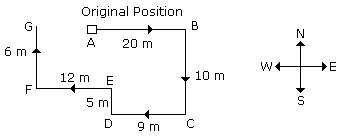Discussion
Home ‣ Verbal Reasoning ‣ Syllogism See What Others Are Saying!
- Question
- Statements:
1. All fish are tortoise.
2. No tortoise is a crocodile.
Conclusions:
I. No crocodile is a fish.
II. No fish is a crocodile
Options- A. Only conclusion I follows
- B. Only conclusion II follows
- C. Both conclusions I and II follow
- D. Neither conclusion I nor II follows
- Correct Answer
- Both conclusions I and II follow
ExplanationFirst Premise is Universal Affirmative (A-type).
Second Premise is Universal Negative (E-type).
All fish are tortoise. ? No tortoise is a crocodile.
A + E ? E - type of Conclusion "No fish is a crocodile".
This is Conclusion II.
Conclusion I is Converse of it. - 1. P is related to Dena Bank in the same way as B is releated to PNB based on the given arrangement. Who amongst the following is D related to, following the same pattern?
Options- A. Syndicate Bank
- B. Canara Bank
- C. Bank of Maharashtra
- D. Indian Bank Discuss
- 2. NA
Options- A. 169
- B. 225
- C. 289
- D. 225 Discuss
- 3. 6, 13,28,59,?
Options- A. 111
- B. 113
- C. 114
- D. 122 Discuss
- 4. What is found necessarily in newspaper?
Options- A. Date
- B. Advertisement
- C. News
- D. Editor Discuss
- 5. 'Cub' is related to 'Tiger' in the same way as 'Kitten' is related to
Options- A. Dog
- B. Cat
- C. Duck
- D. Swan Discuss
- 6. Find the odd one out:
Options- A. Arc
- B. Diameter
- C. Diagonal
- D. Tangent Discuss
- 7. Sundar runs 20 m towards East and turns to right and runs 10 m. Then he turns to the right and runs 9 m. Again he turns to right and runs 5 m. After this he turns to left and runs 12 m and finally he turns to right and 6 m. Now to which direction is Sundar facing?
Options- A. East
- B. West
- C. North
- D. South Discuss
- 8. How many persons are seated between V and R?
Options- A. One
- B. Two
- C. Three
- D. Four Discuss
- 9. A river must have
Options- A. Fish
- B. Weeds
- C. Banks
- D. Boats Discuss
- 10. NA
Options- A. 46, 57
- B. 38, 49
- C. 41, 52
- D. 64, 73 Discuss
More questions
Correct Answer: Indian Bank
Explanation:
(d) is the right answer
Correct Answer: 225
Explanation:
Except '225' , all the other are perfect squares of natural numbers.
Correct Answer: 122
Explanation:
So, missing term = 59 x 2 + 4 = 122.
Correct Answer: News
Correct Answer: Cat
Explanation:
As 'Cub' is young one of 'Tiger' similarly 'Kitten' is young one of 'Cat'.
Correct Answer: Diagonal
Explanation:
Rest are the parts of a circle.
Correct Answer: North
Explanation:

Therefore, it is clear that Sundar will face towards North.
Correct Answer: Two
Explanation:
Row 1. ? P V S T R Q
Row 2. ? C F A E B D
(b)is the correct answer.
Correct Answer: Banks
Explanation:
A river must have its bank.
Correct Answer: 64, 73
Explanation:
Except '64,73', all are having difference of 11.
Comments
There are no comments.More in Verbal Reasoning:
Programming
Copyright ©CuriousTab. All rights reserved.
